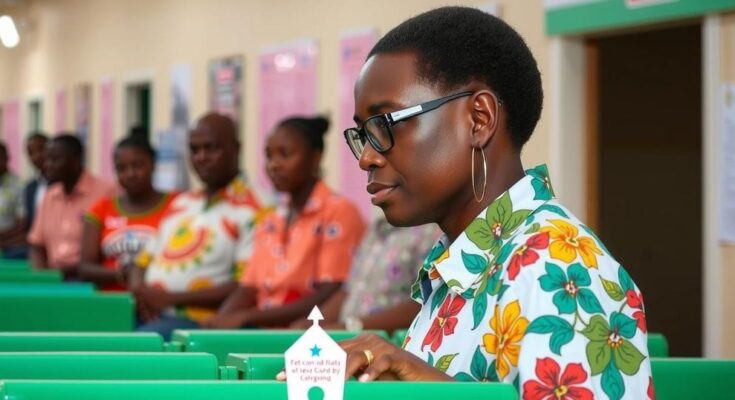Polls opened in Ghana for presidential and legislative elections amid significant economic challenges. With 18.7 million registered voters, the race is primarily between Vice President Mahamudu Bawumia of the NPP and former President John Mahama of the NDC. While the election comes at a time of severe inflation and job scarcity, both candidates present limited differences in their proposed solutions to the economic crisis.
Polling stations opened on Saturday for a crucial presidential and legislative election in Ghana, a nation that has historically epitomized democratic resilience in West Africa. Approximately 18.7 million citizens are eligible to participate in this election, which is taking place amidst the most severe economic crisis the country has faced in decades. Despite the presence of twelve candidates vying for the presidency, the election is predominantly perceived as a contest between Vice President Mahamudu Bawumia of the ruling New Patriotic Party (NPP) and former President John Dramani Mahama of the opposition National Democratic Congress (NDC).
Ghana, once regarded as a model of democracy within the region, has been beleaguered by rising inflation and rampant unemployment as it grapples with profound economic challenges. A recent Afrobarometer poll reveals that 82% of Ghanaians believe their country is not moving in the right direction. While both primary candidates emphasize their respective plans for economic recovery, analysts suggest there is little substantive difference between their proposed policies.
In addition to the presidential race, 276 parliamentary seats are also at stake, with the ruling NPP and the NDC each holding 137 seats in the current legislature. In pre-election rallies, both candidates have made fervent appeals to voters, with Bawumia asserting his commitment to continue the policies of the current administration, while Mahama has promised a comprehensive “reset” of the country’s governance and economic systems. The atmosphere in Accra reflects a mix of enthusiasm and anxiety as voters approach the polls amid dire economic circumstances.
The economic crisis has been exacerbated by the country’s default on foreign debt last year, coupled with a significant inflation rate peaking at 54%. Although there are signs of improvement, many citizens continue to feel the pinch of rising prices for essentials. Furthermore, illegal mining activities, known locally as “galamsey”, have heightened tensions during the campaigning period, leading to public outcry against the government’s failure to address the issue. The significance of this election extends beyond mere political representation; it also encapsulates the hope for a revitalized economy and improved living conditions for the Ghanaian populace.
Ghana is historically recognized as a stable democracy in West Africa, having undergone multiple peaceful transitions of power since returning to multiparty politics in 1992. However, recent years have seen the nation face significant economic challenges, impacting the livelihoods of its citizens. Socioeconomic issues such as inflation, unemployment, and environmental concerns due to illegal mining have dominated public discourse, making the upcoming elections a critical juncture for national recovery and governance.
In conclusion, the elections in Ghana signify a crucial moment in the nation’s democratic journey, occurring under the shadows of severe economic hardship. With a large voter population and pressing economic issues at the forefront, the outcomes of this election hold immense potential to either stabilize or further fragment a struggling economy. As citizens cast their votes, they carry the weight of their aspirations for a better future amidst the promise of reform from the candidates.
Original Source: www.voanews.com




